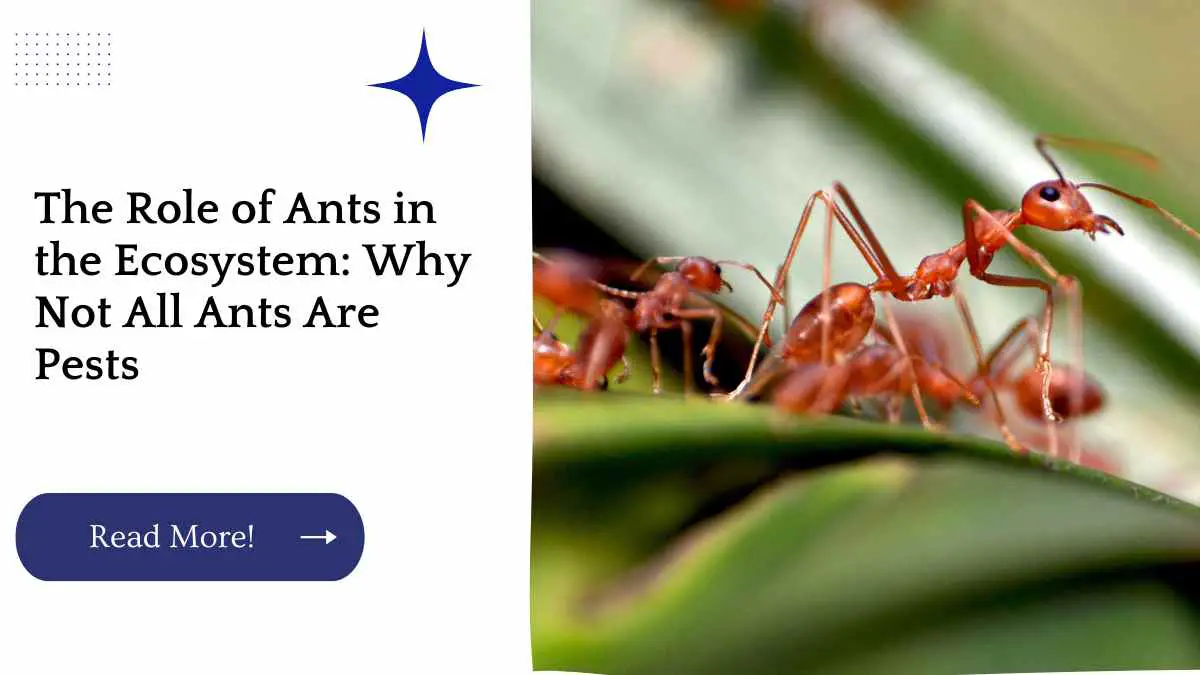Ants are one of the most widespread and recognizable insects in the world. They can be found in almost every habitat, from the Arctic to the tropics, and are an essential part of many ecosystems. Despite their small size, ants play a big role in maintaining the balance of nature and support the growth of other organisms.
| Takeaways |
|---|
| Ants have an integral role to play in their ecosystem, helping with pollination, seed dispersal, and pest control. |
| Not all ant species are harmful; some are actually beneficial and help maintain the balance of their particular ecosystem. |
| While ant colonies can sometimes be a nuisance to humans, it’s important to consider non-toxic alternatives to pest control that won’t harm the environment or other important insects. |
| To keep ant populations thriving in your area, it’s important to help protect and maintain their natural habitats. |
| Understanding the ecological importance of ants can help us better appreciate the crucial role they play in our world. |
Types of Ants
There are many different species of ants, each with their own unique characteristics and behaviors. Some of the most common types of ants include carpenter ants, fire ants, and harvester ants.
Carpenter ants are known for their ability to tunnel through wood, causing damage to buildings and other structures. Fire ants are named for their painful, burning sting and are considered pests in many parts of the world. Harvester ants, on the other hand, are valued for their role in pollinating plants and controlling other insect populations.
Are ants becoming a nuisance in your garden? Learn how to maintain a balance between pest control and biodiversity with our guide on Managing Ants in Your Garden, and keep these tiny creatures from wreaking havoc on your plants.
Ants as Decomposers
One of the key roles that ants play in the ecosystem is as decomposers. They help to break down dead plants and animals, recycling important nutrients back into the soil. This process is essential for maintaining the health of the ecosystem and supporting the growth of other organisms.
| Role | Example |
|---|---|
| Decomposers | Some ant species, such as the desert seed-harvester ant, help break down organic matter in their environment. |
| Nutrient cycling | Ants transport nutrients throughout the soil, allowing plants to access them more easily. |
| Soil health | Ants improve soil aeration and water retention, promoting healthy plant growth. |
| Waste management | Ants remove dead animals and help transfer nutrients back into the environment. |
Ants as Pollinators
In addition to their role as decomposers, ants also play a role in pollination. They help flowers to reproduce by transferring pollen from one plant to another, which is crucial for the survival of many plant species. By encouraging biodiversity, ants help to maintain the overall health of the ecosystem.
Ants as Herbivores
Ants also play a role as herbivores, feeding on plant material and helping to control pest populations. This helps to balance food chains and prevent any one species from becoming too dominant. By consuming pests, ants also reduce the need for pesticides and other harmful chemicals, making their role in the ecosystem even more important.
Don’t let ants contaminate your food storage areas. Keep your kitchen free from these pests using our expert tips and tricks for eradicating ants in your food storage areas.
Ants as Predators
In addition to their role as herbivores, ants also act as predators, preying on other insects and helping to maintain insect populations. By controlling pest populations, ants help to protect crops and other valuable plants, making them an essential part of agricultural ecosystems.
| Role | Example |
|---|---|
| Pest control | Ants prey on other insects, such as aphids and termites, reducing the amount of damage they can do to crops and other plants. |
| Invasive species management | Ants can help control populations of invasive species, such as the Argentine ant, which can outcompete native ant species. |
| Seed dispersal | Some ant species help disperse seeds, allowing plants to spread and establish in new areas. |
| Cannibalism | In some cases, ants will eat members of their own colony if they are sick or if there is a shortage of food. This helps prevent the spread of disease and ensures the survival of the colony. |
Ants and Plant Growth
Ants also play a role in helping plants to grow. By providing nutrients to plants, ants support their growth and help to ensure their survival. In some cases, ants even help to protect plants from other insects and animals that might otherwise cause damage.
Mosquito bites can be not only itchy but also potentially dangerous. To avoid complications from mosquito bites, check out our guide on treating a mosquito bite to relieve itching and prevent infections from occurring.
Ants and Soil Structure
Ants also play a role in improving soil structure and fertility. By creating underground habitats, ants help to aerate the soil and improve its structure. This, in turn, makes it easier for other organisms to grow and thrive.
Ants and Nutrient Cycling
In addition to their role in soil structure, ants also play a role in nutrient cycling. They help to distribute nutrients throughout the ecosystem, supporting the growth of other organisms and maintaining the overall health of the environment.
Are you a pet owner struggling to find safe ways to get rid of ants? Check out our article on Pet-Friendly Ant Control and discover effective methods to keep ants away without jeopardizing your furry friends’ health.
Ants and Seed Dispersal
Ants also play a role in seed dispersal, transporting seeds to new locations and helping plants to colonize new areas. This helps to ensure the survival of plant species and contributes to the overall diversity of the ecosystem.
| Role | Example |
|---|---|
| Seed carriers | Ants can carry and transport seeds over long distances, helping to disperse plant species throughout an ecosystem. |
| Elaiosome removal | Some seeds are coated in an elaiosome, a fleshy structure that provides food for ants. Ants will carry these seeds back to their colonies to feed on the elaiosomes, effectively planting the seeds in nutrient-rich underground areas for germination. |
| Biodiversity | Ants’ ability to disperse seeds helps promote plant biodiversity, which in turn contributes to the overall health of the ecosystem. |
| Invasive species management | By preventing invasive plant species from establishing monopolies, ant-mediated seed dispersal helps protect native species and maintain the balance of ecosystems. |
Ants and Climate Regulation
Finally, ants play a role in regulating local temperature and moisture levels, which can affect the overall health of the ecosystem. By contributing to global climate patterns, ants help to maintain the balance of the planet and ensure its long-term stability.
Ants as Indicators of Environmental Health
Ants are also important indicators of environmental health. By reflecting the overall health of an ecosystem, ants provide early warnings of environmental problems and help to ensure that action is taken to address these issues.
Enjoy a day at the beach without worries of sand flea bites by following our guide on getting rid of sand fleas. Learn about these pesky insects and our expert advice on how to prevent and treat sand flea bites.
Conclusion
In conclusion, ants play a vital role in the ecosystem, contributing to the decomposition of dead plants and animals, pollination, herbivory, predation, plant growth, soil structure, nutrient cycling, seed dispersal, climate regulation, and environmental health. By protecting ants and their habitats, we can ensure the long-term health of our planet and support the growth of other organisms.
Further Reading
If you want to learn more about the importance of ants in ecosystems, check out some of these helpful resources:
Espace pour la vie’s article on the ecological importance of ants.
The Harvard Forest website offers a comprehensive overview of ants’ ecological importance and the research being done in that field.
Truly Nolen’s article on ant control and their role in the ecosystem provides a great overview of the positive impact ants can have.
FAQs
What are some ant species that are beneficial to the environment?
Some ant species that are beneficial to the environment include honey pot ants, which can help sustain other insects in dry environments, and leafcutter ants, known for their ability to fertilize soil.
How do ants help with the pollination of plants?
As ants travel between plants, they help transport pollen and pollinate plants. This process is especially important in environments where other pollinators, such as bees or butterflies, are in short supply.
Can ants help control other pests in my garden?
Yes! Certain ant species, such as the Argentine ant, can help control other garden pests, including aphids and whiteflies.
Can ants be used to help control invasive species?
Yes, there is evidence that some ant species can help control invasive plant species by spreading their seeds and making it difficult for invasive plants to grow.
What can I do to help conserve ant populations in my area?
You can help conserve ant populations in your area by reducing the use of pesticides, maintaining natural habitats, and participating in citizen science projects that monitor the health of local ant populations.

Hello! I’m Hellen James, and I write about how to keep pests from invading your home. For the last 10 years, I’ve been working in pest control and am excited to share my expertise with you!


